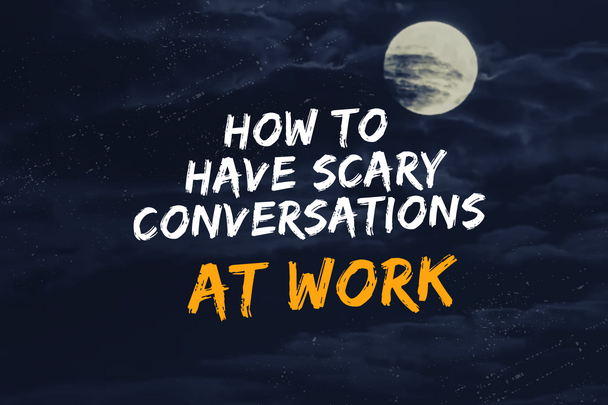Halloween is the scariest time of the year – nothing haunts you quite like witches and vampires roaming around. Does anything else even compare? Well, maybe. If you’re an employer who doesn’t know how to handle difficult conversations at work, every day can be as scary as Halloween.
Uncomfortable conversations can be intimidating on both ends, but you can avoid the fear factor if you know how to properly approach and handle them. Review our tips below on how to make difficult conversations at work less frightening, so that the only thing scaring anybody in the office are those Halloween decorations.
Set Up a Meeting
Having difficult conversations at work can be, well, difficult. Nobody wants to put themselves in a tense and awkward situation, so you might be inclined to push it off as long as you can. But, the longer you put it off, the more the situation could grow – in more ways than one. If an employee is doing something incorrectly, it could only get worse if they’re not immediately made aware of it. Or, the anticipation of the upcoming, but in-the-air conversation could create unnecessary anxiety for you and the employee.
To keep the situation from becoming scarier than it needs to be, set up a meeting as soon as possible for you two to talk. If the conversation is something that can be made into more regular discussions, like performance reviews, you could set up monthly check-in meetings to provide any necessary feedback. Monthly meetings could help to relieve any pressure and make conversations that were once tough more relaxed.
Listen and be Empathetic
During a difficult conversation at work, make sure you’re not doing all the talking. Conversations are two sided and should always be treated as such. Hearing what your employee has to say about the topic at hand will offer a different perspective, and it will assist in a resolution. At the very least, listening to your employee will show that you value their viewpoint and respect their feelings.
Once you hear what your employee’s thinking, show empathy towards them, not sympathy. If you only feel sympathy towards your employees, they’re never going to feel like you actually understand the situation or how it makes them feel, which can lead to a huge disconnect between them and you. While it’s your job to keep the office or your team productive and running smoothly, it’s also your job to make your employees feel welcomed and understood. If they start to feel like you are discarding their feelings or where they’re coming from during difficult conversations at work, the conversation is going to be less constructive and more accusatory, and you’re less likely to come out of it with a successful and attainable resolution.
Come Up with Solutions
Make sure that the difficult conversation at work that you’re having isn’t just disappointment and criticism. A good employer will make sure that it’s constructive and ends with a possible resolution, because it’s an employer’s responsibility to help their employees grow and better themselves in the workplace.
If your employee was asking for a raise that isn’t possible at the moment, don’t just tell them it can’t happen and that they need to wait. Brainstorm with your employee to figure out ways they can increase their productivity at work or new tasks they could take on that could make a raise more attainable in the future.
Don’t Leave Them Hanging
In a perfect world, difficult conversations at work are over as soon as you leave the room. However, most of them find ways to linger, which can affect our thoughts and emotions long term. For example, if the discussion was to tell an employee they didn’t get that promotion they were really shooting for, that discouragement isn’t going to disappear once they’re out of your sight, and they may even feel some displaced resentment towards you for not giving it to them.
In order to keep your employee feeling positive and keeping your relationship with them intact, try to have follow-up conversations afterwards to check-in. If you weren’t able to come up with a resolution during the initial conversation, set up another meeting to discuss possible solutions so they know you haven’t forgotten about them. If you know that you really delivered some tough news, reach out and see how their day is going, or maybe grab some lunch together. Try to keep their employee experience positive so they continue to feel comfortable and appreciated.
——–
While it’s easy to get tied up in the fact that delivering bad news is an undesirable task, it’s important to remember that hearing it isn’t too great either. Remember that your employees are more than just someone who works for you, and their reactions to bad or unwanted news are valid and understandable. As an employer, it’s your job to make sure that you’re being respectful and productive in these situations, and doing what you can to keep them from being big and scary – leave that stuff to the witches and vampires.











